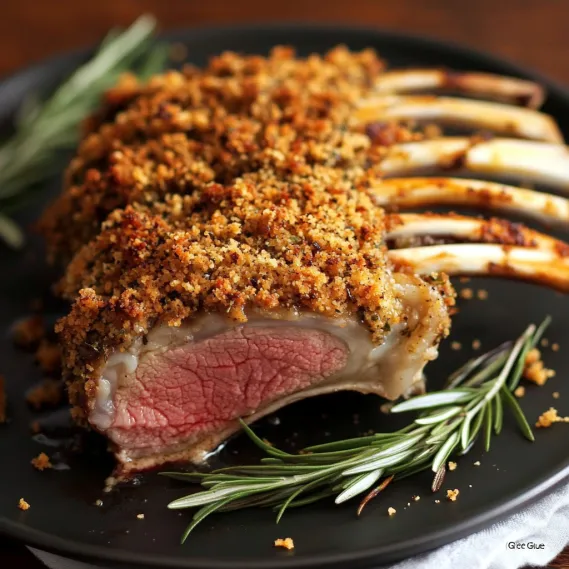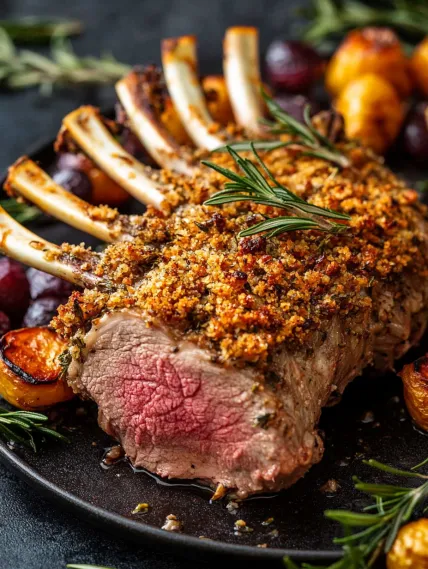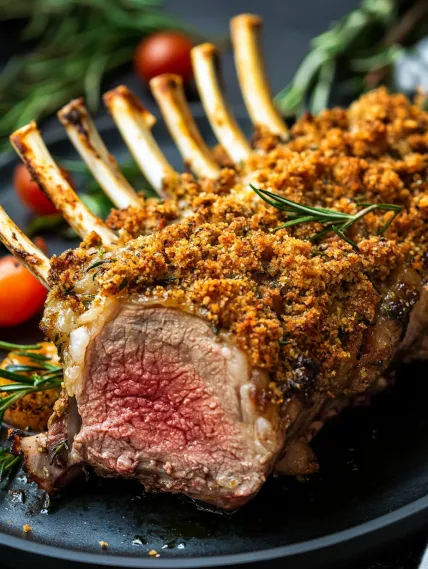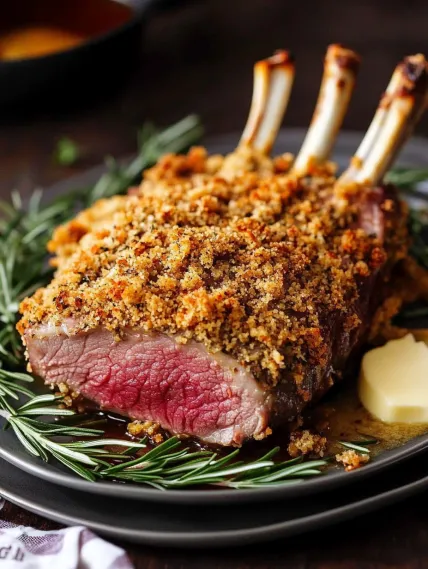 Pin it
Pin it
This crunchy rosemary rack of lamb takes an already fantastic cut to dazzling new levels. The top-quality meat, naturally juicy and tender, gets a wonderful upgrade with a crispy, herb-packed coating that brings both crunch and taste to every mouthful. A smart method makes sure the crust sticks perfectly during cooking, while keeping the inside beautifully pink and moist. You can go simple to showcase the meat itself, add a rich cream sauce, or lay it over bright pea puree – whatever you choose, this dish makes a knockout centerpiece for important gatherings that'll wow even your fussiest guests.
When I first made this for my family dinner, everyone went completely quiet while taking their first bites. My brother usually likes his meat plain and simple, so we were all shocked when he grabbed more of the crumbed version. What I really like is how the garlic and rosemary in the coating boost the lamb's natural taste instead of hiding it, making everything work together perfectly on your plate.
Key Ingredients and Shopping Advice
- Lamb Rack: Pick what fits your taste and wallet. "Frenched" racks (with clean bones) look fancier but cost more, while "cap on" racks have extra flavor from the fat.
- Breadcrumbs: Panko gives you the most crunch, but standard breadcrumbs do just fine. Fresh ones make a more homestyle coating.
- Fresh Rosemary: Really needed for true flavor. Dried works in emergencies but won't smell as amazing.
- Dijon Mustard: Makes a tasty base that helps the coating stick. Grainy mustard can add nice texture.
- Parmesan: Brings rich, savory depth to your crust. Grate it fresh for best results.
Through lots of cooking trials, I've found that the lamb quality really matters for your final dish. When I can, I buy racks that aren't trimmed and do it myself to save money without losing any quality – the crumb coating hides any less-than-perfect trimming anyway.
Step-By-Step Cooking Guide
- Step 1: Get Your Lamb Ready
- Put plenty of salt and pepper all over your lamb rack. Heat up a spoonful of oil in a heavy pan on high until it's really hot. Quickly brown the lamb on all sides until golden, about 1-2 minutes each side. This builds flavor and keeps juices inside. Take it off the heat and let it cool a bit before coating.
- Step 2: Mix Up Your Flavor Base
- In a small bowl, stir together 3 tablespoons Dijon mustard, 3 teaspoons beaten egg, 1 tablespoon finely chopped fresh rosemary, and 2 minced garlic cloves. This mix does two jobs – it adds flavor and works as the sticky stuff that keeps your crumbs on the meat. The egg is your secret weapon against the common problem of crumbs falling off while cooking.
- Step 3: Nail The Coating Process
- In another flat dish, mix 1 cup panko breadcrumbs, 1/4 cup freshly grated parmesan, 1 tablespoon finely chopped rosemary, and 2 tablespoons finely chopped parsley. Using a brush or your fingers, spread the mustard mix evenly on all sides of the browned lamb. For putting on the crumbs, press the bottom of the rack into them first, then roll and push the other sides to cover everything completely.
- Step 4: Cook It Just Right
- Heat your oven to 390°F (200°C). Put the crumb-covered rack bone-side down on a baking tray with parchment paper. Cook for 15-18 minutes for medium-rare (inside temp of 130-135°F/55-57°C) or 20-22 minutes for medium (140°F/60°C). Remember the meat will keep cooking a bit while resting, so take it out just before it's exactly how you want it.
- Step 5: Let It Rest Before Cutting
- Move the lamb to a warm plate and let it sit, loosely covered with foil, for 5-10 minutes before cutting. This key step lets the juices spread back through the meat, making it more tender and flavorful. Cut between the bones to make individual pieces, and arrange them on your serving plate with whatever sides you've chosen.
 Pin it
Pin it
The first time I tried making this, I didn't use egg in the mustard mix and got really disappointed when most of my beautiful crust fell off during cutting. Since adding this simple trick, the coating stays perfectly in place, keeping both the look and flavor in every bite.
Mastering Your Wok Skills
You need super high heat for real fried rice. My grandma always told me to heat the wok till it's smoking before adding any oil. Don't stop moving everything around to get that special "wok hei" flavor. Never put too much in at once—cook in smaller batches instead. This approach completely changed my fried rice into something you'd think came from a restaurant.
 Pin it
Pin it
Smart Ways To Use Up Extras
This dish does wonders for turning leftovers into something totally new. I've tried leftover roast chicken, holiday ham, and even Thanksgiving turkey with great results. Just cut your meat into similar-sized pieces so they spread out evenly. Leftover grilled steak works amazingly well with its smoky edges adding tons of flavor. Even roasted veggies bring a lovely sweet caramelized taste to the mix.
Getting Tastes And Textures Right
Great fried rice needs balanced ingredients. Char siu gives richness, prawns add sweetness, eggs bring silkiness, and veggies offer crunch. The order matters too—start with aromatics to build flavor, add eggs in the middle so they stay distinct, put veggies in late so they stay crisp. Throwing in spring onions last keeps them bright and fresh for that true restaurant finish.
Changing It For Different Diets
You can easily adjust this dish for dietary needs. For vegetarians, I skip the meat, double up on eggs and add more veggies. My low-carb friends love when I use cauliflower rice instead – it soaks up all the flavors beautifully. When cooking for gluten-sensitive guests, I swap in tamari for soy sauce and make sure any chicken powder is certified gluten-free. This way, everyone gets to enjoy this favorite dish no matter their restrictions.
Three Amazing Serving Ideas
After lots of family arguments about the best way to serve this dish, I've now got three perfect options for any situation. For people who love simplicity, just carve and serve the rack showing off its pink inside and golden crust – this lets the quality meat and aromatic coating shine without any distractions. It's perfect for those who really appreciate lamb's natural flavor. For fancy occasions, I make a luxurious Creamy White Wine Mustard Sauce by cooking shallots in butter, reducing some white wine, then adding cream, Dijon mustard, and fresh herbs. The sauce brings richness that works beautifully with the lamb without taking over. The third way, maybe the prettiest one, is serving the carved rack on top of a bright green pea puree, which both acts like a sauce and looks stunning while adding some fresh veggie goodness to your plate.
Side Dishes For Every Season
This fantastic main dish works well with different sides throughout the year. In spring, I pair it with steamed asparagus and tiny new potatoes for a fresh, light meal. Summer calls for something Mediterranean – I go with tomato and cucumber salad simply dressed with good olive oil and fresh herbs. Fall is perfect for roasted root veggies tossed with maple and rosemary that match the flavors in the crust. For winter meals, nothing beats creamy garlic mashed potatoes and glazed carrots alongside this impressive roast. Whatever the season, I always keep the sides fairly simple to let the lamb remain the star attraction.
Wines That Match Perfectly
The rich, distinctive taste of lamb with its aromatic herb crust offers some wonderful wine pairing chances. Red wine fans should try a medium-bodied Pinot Noir that has enough structure without overwhelming the delicate meat, while its earthy notes go great with the rosemary. If you like stronger wines, a Syrah/Shiraz really brings out the savory aspects of the dish. When serving with the cream sauce, think about a full-bodied Chardonnay with good acidity to cut through the richness. For special celebrations, this dish stands up beautifully to vintage Champagne, making an elegant combo that lifts any gathering to new heights.
 Pin it
Pin it
This Rosemary Crumbed Rack of Lamb has become my go-to dish for special events, always getting gasps when I bring it to the table. What started as just trying something new has grown into a trusted recipe that works every time. The mix of premium meat, aromatic herb crust, and flexible serving options makes it work for everything from quiet anniversary dinners to big holiday feasts. Now that great restaurant meals cost more than ever, knowing how to make this dish lets you create truly special moments right at your own dinner table.
Frequently Asked Questions
- → What does Frenched mean?
- It’s a trimmed rack with less fat and a polished look.
- → Can I skip the egg?
- No, it’s key for keeping the crumbs in place.
- → How long to bake?
- If trimmed (Frenched), 20 mins; if not, closer to 35.
- → Do I need sauce?
- That’s up to you—lamb stays juicy either way.
- → Does it reheat well?
- Absolutely! Use a microwave or warm up gently in the oven.
